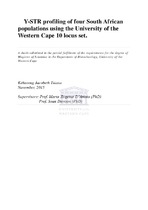Y-STR profiling of four South African populations using the University of the Western Cape 10 locus set
Abstract
In this study the 10 Y-specific loci of the University of the Western Cape (DYS710, DYS518 385a/b, DYS644, DYS612, DYS626, DYS504, DYS447, DYS447, and DYS481) were analysed in 492 individuals from South African population groups. Four different populations namely; Zulu, Coloured, Afrikaner and Asian Indian were sampled. A total of 488 haplotypes were observed, 412 of which were unique. Haplotype diversity was 0.9981. Gene Diversity values ranged from 0.8075 for DYS447 to 0.9209 for DYS710. The discriminatory capacity was 0.9106 which is high. The study showed that the University of the Western Cape 10 locus is a powerful discrimination tool for routine forensic applications and could be used in genealogical investigations as compared to other commercial kits when used on the South African populations (Zulu, Coloured, Afrikaner and Asian Indian) considering its high discriminatory capacity. This data will be used for the establishment of a Y-STR DNA databases for South African population which would aid law enforcement authorities in the investigation and resolution of crimes AMOVA computed using haplotype frequencies showed that when male haplotypes from the four different populations were compared, 0.22 % of the total genetic variation was due to the variability among populations and 99.78 % of the total variation is found within populations. However AMOVA computed using distance matrix showed that 5.97 % of the total variation was due to variability among populations and 94.07 % of the total variation is found within populations. Genetic substructure was found among the four studied South African population groups. All the six population pairwise comparisons using AMOVA were significant .Therefore Y-STRs are very useful in comparing closely related populations. It should be noted that their utility for evolutionary purposes, they need to be combined more stable Y-DNA markers such as single nucleotide polymorphisms (SNPs). Factorial Correspondence Analysis (FCA) showed that the Coloured population has large genetic contribution from Afrikaner population and lesser contribution from the Zulu and Asian Indian population groups.

